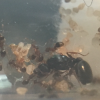- Formiculture.com
- Forums
- Gallery
- Members
- Member Map
- Chat

Disease?
Started By
Amazant
, Sep 4 2019 1:26 PM
5 replies to this topic
#1
 Offline
-
Posted September 4 2019 - 1:26 PM
Offline
-
Posted September 4 2019 - 1:26 PM
This is my second year of keeping ants but I have been reading more discussions on queen ants suddenly falling on their backs twitching or having a “seizure” this happened to one of my colonies queens and she was doing perfectly fine before but then she just started twitching on her back. Some other instances of this twitching behavior happened with workers falling in there back and twitching and it either only happens just to the workers or just to the queen. Has any research been done on this? Or is this just due to stress?
Colonies: Formica pallidefulva, Lasius neoniger, Camponotus decipiens, Camponotus sp, Camponotus Vicinus, Crematogaster Sp
#2
 Offline
-
Posted September 5 2019 - 5:24 PM
Offline
-
Posted September 5 2019 - 5:24 PM
I should have read this before posting my request. The same thing just happened to me today. I have 9 young colonies (4-8 ants each) and 3 workers from one colony are having similar seizures. T-virus? Radioactive mealworms? I'm stumped.
#3
 Offline
-
Posted September 6 2019 - 1:38 PM
Offline
-
Posted September 6 2019 - 1:38 PM
I would just like to know what the colony was doing before this happened, or if there was a change in temperature, different food, or a colony move. This happened to me with a lasius species after she moved into a new outworld and I have seen many other topics on there queens dying from the “Seizures” after a few days of twitching.
Colonies: Formica pallidefulva, Lasius neoniger, Camponotus decipiens, Camponotus sp, Camponotus Vicinus, Crematogaster Sp
#4
 Offline
-
Posted September 6 2019 - 5:42 PM
Offline
-
Posted September 6 2019 - 5:42 PM
It is odd, but there were no significant changes that I saw. I moved the the 3 workers and queen that weren't twitching to a tub and they're doing fine. The others I moved to a test tube where they twitched on for a while and were dead by morning.
#5
 Offline
-
Posted September 7 2019 - 6:11 AM
Offline
-
Posted September 7 2019 - 6:11 AM
there is a certain bacteria that is usually present in wild Camponotus nests which allows them to live on nutrient deficient diets, could these colonies not have it?
#6
 Offline
-
Posted September 7 2019 - 10:11 AM
Offline
-
Posted September 7 2019 - 10:11 AM
there is a certain bacteria that is usually present in wild Camponotus nests which allows them to live on nutrient deficient diets, could these colonies not have it?
Edited by MrKotter, September 7 2019 - 10:12 AM.
0 user(s) are reading this topic
0 members, 0 guests, 0 anonymous users














